Supplements are a hot topic. There are so many supplements out there that it can get confusing to know exactly what you need. I partnered with New Chapter for this blog post to help reduce some of the confusion around supplements and help you understand what I consider essential daily supplements. While there are always exceptions, almost everyone can benefit from taking a few high-quality daily supplements.
Do you need to take supplements?
Supplements are meant to fill in the gaps of your overall diet. So if you are eating a healthy, well-balanced diet do you still need supplements?
In my opinion as a dietitian, yes!
Even if your nutrition is on-point, most people still need supplements. Now, this wasn’t always my answer. In school we were taught that if you’re eating a balanced diet, getting all the recommended servings of fruits, vegetables, whole grains and dairy, you may not need supplements. But after diving into more research and seeing clients, my opinion has changed. Supplements are just as essential to our health as a well balanced diet.
Why do we need supplements?
While I fully support the idea of “food first, supplements second”, most people could use a boost from supplements to fill in the gaps. In order to feel our best we need to have optimal levels of nutrients, not just enough to prevent deficiencies. Supplements aren’t meant to replace nutritious eating but rather help ensure you are meeting your optimal nutrient needs to look and feel your best.
There are so many factors, both dietary and environmental, that create the need for essential daily supplements.
-
- Standard American Diet (SAD) – this phrase is now used to categorize the way most Americans eat. It’s estimated that 75% of America is eating a diet low in fiber and low in the necessary vitamins and minerals from fruits and vegetables. In turn their intake is high in processed foods, sugar, refined grains and inflammatory vegetable oils. (1)
- Mineral and nutrient loss – our foods just aren’t as nutrient-dense as they used to be. The nutrients in our foods have decreased with depletion of the nutrients in the soil. Some foods have an estimated decrease of 5 – 40% in certain nutrients. The longer food travels and sits in the grocery store, the more nutrients get depleted. (2) (3) (4)
- Stress and Environmental Toxins – we’re bombarded by stress and environmental toxins daily. These tax our bodies and can deplete nutrients, making our needs greater than the average recommendation. (5)
- Medications – many medications take a toll on our nutrient stores or interfere with the absorption of nutrients. If you are on any medication, it’s important to discuss nutrient interaction with your healthcare practitioner to see if supplementation is needed. (6)
- Phase of Life – we have different nutrient needs at different phases of life. As we age, our bodies may require more or less of certain nutrients. Physical and emotional stress also comes with different stages of life. As mentioned above, stress can tax the body and deplete it of certain nutrients. (7)
- Individual Health – we each have very different, unique health needs. Digestion, hormones, health conditions and genetics all play a role in determining the amount of certain nutrients we need and if supplements are necessary. (8) (9)
- Food Preferences or Intolerances – depending on your current eating style, you may need supplements. Whether you follow a vegan, gluten-free, dairy-free, etc. diet because it makes you feel your best or you have to due to allergies or intolerances, supplements may be necessary. Anytime you are eliminating certain foods or food groups from your diet, you need to pay extra attention to ensure you’re not missing important nutrients. (10)
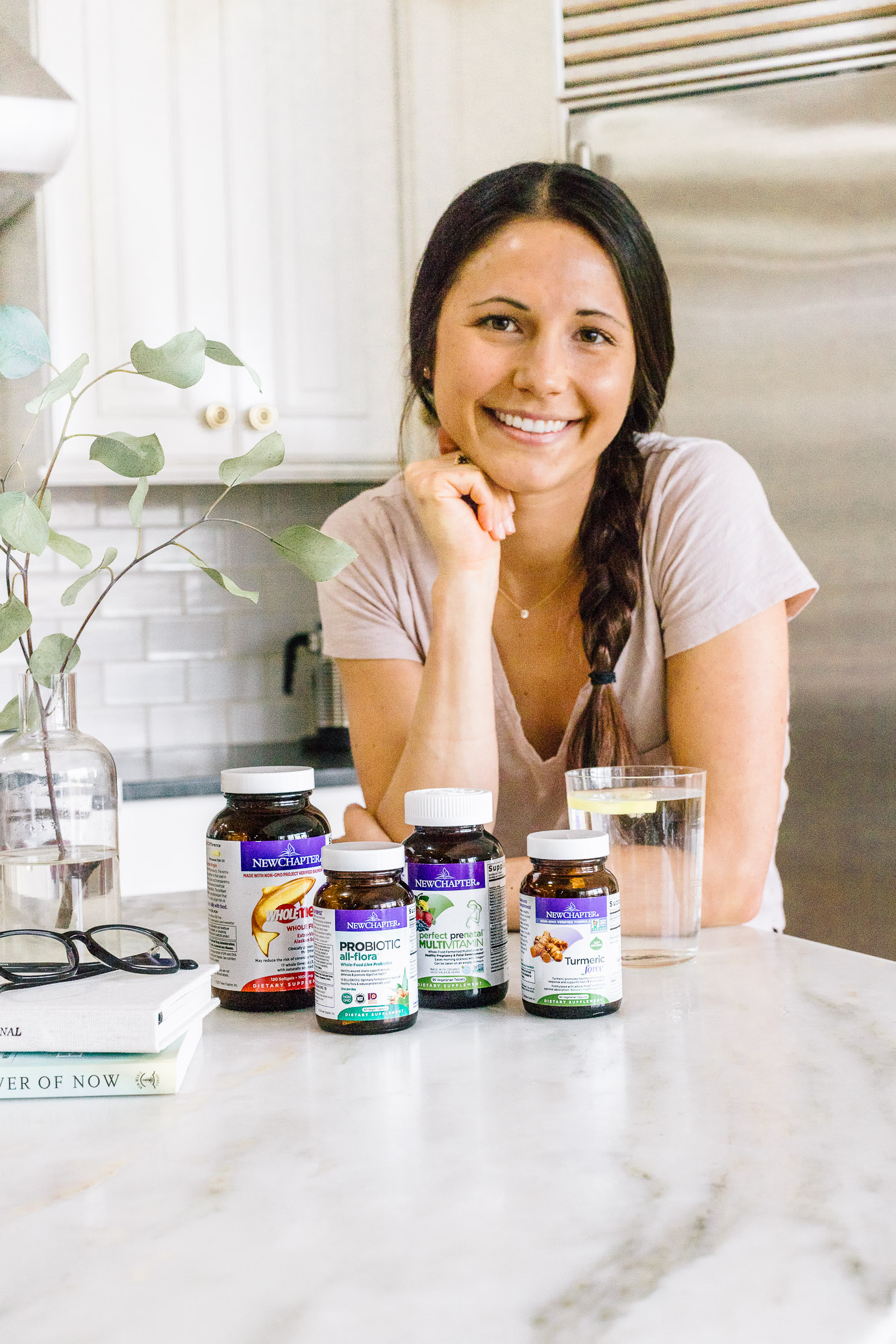
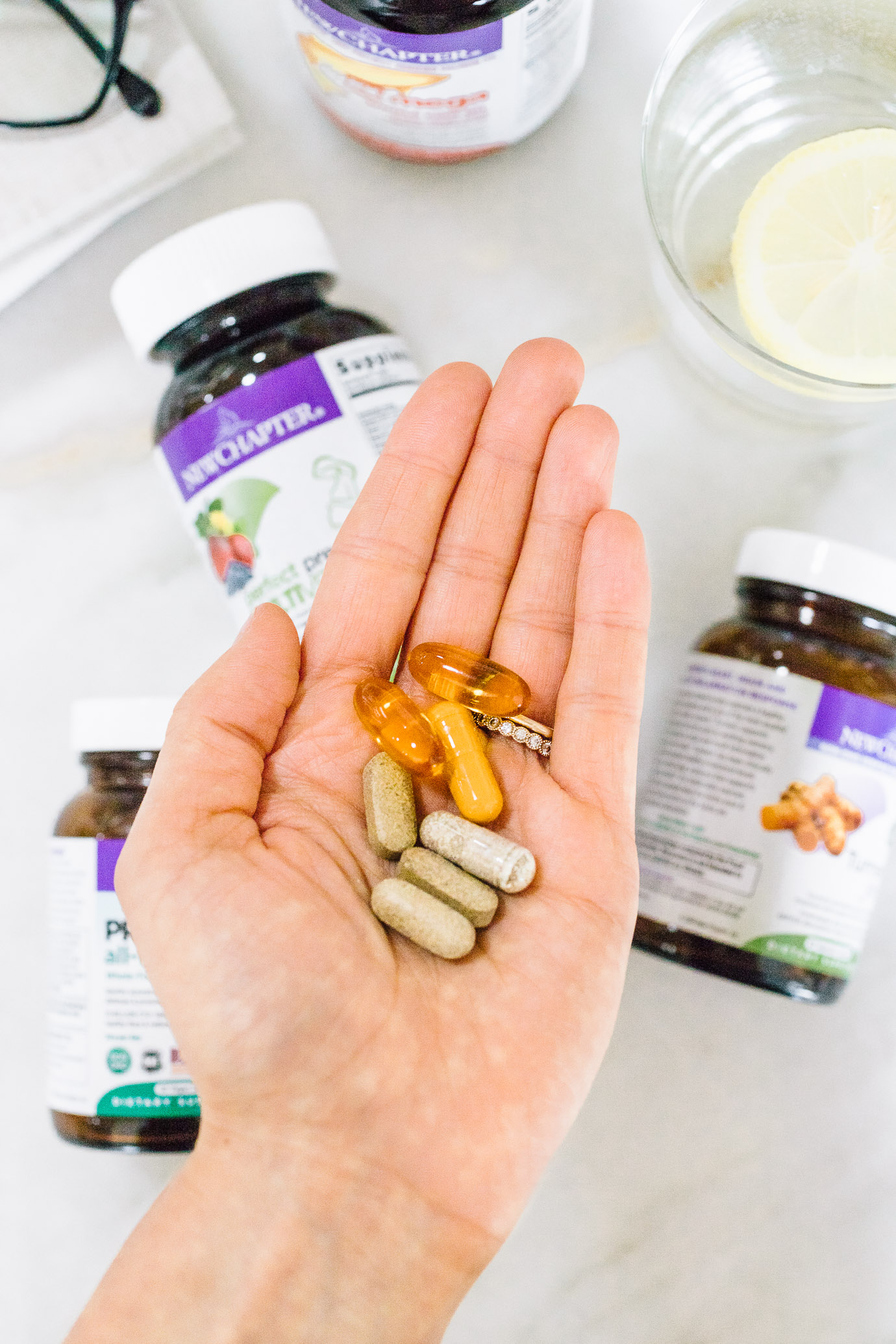
What Essential daily supplements should you take?
The supplements you take should be unique to your individual needs. Working with a registered dietitian can help you identify the gaps in your diet and determine a supplement regimen that fits your needs. If this is something you are interested in, I’d love to work with you through 1:1 coaching.
Just a reminder, this is a guide to basic essential daily supplements. I cannot stress enough that every individual’s needs are different! It’s always best to work with a qualified practitioner to figure out what supplements are best for you. That being said, there are a handful of supplements most people can benefit from adding to their daily routine. Just remember to check with your doctor before starting any new supplements.
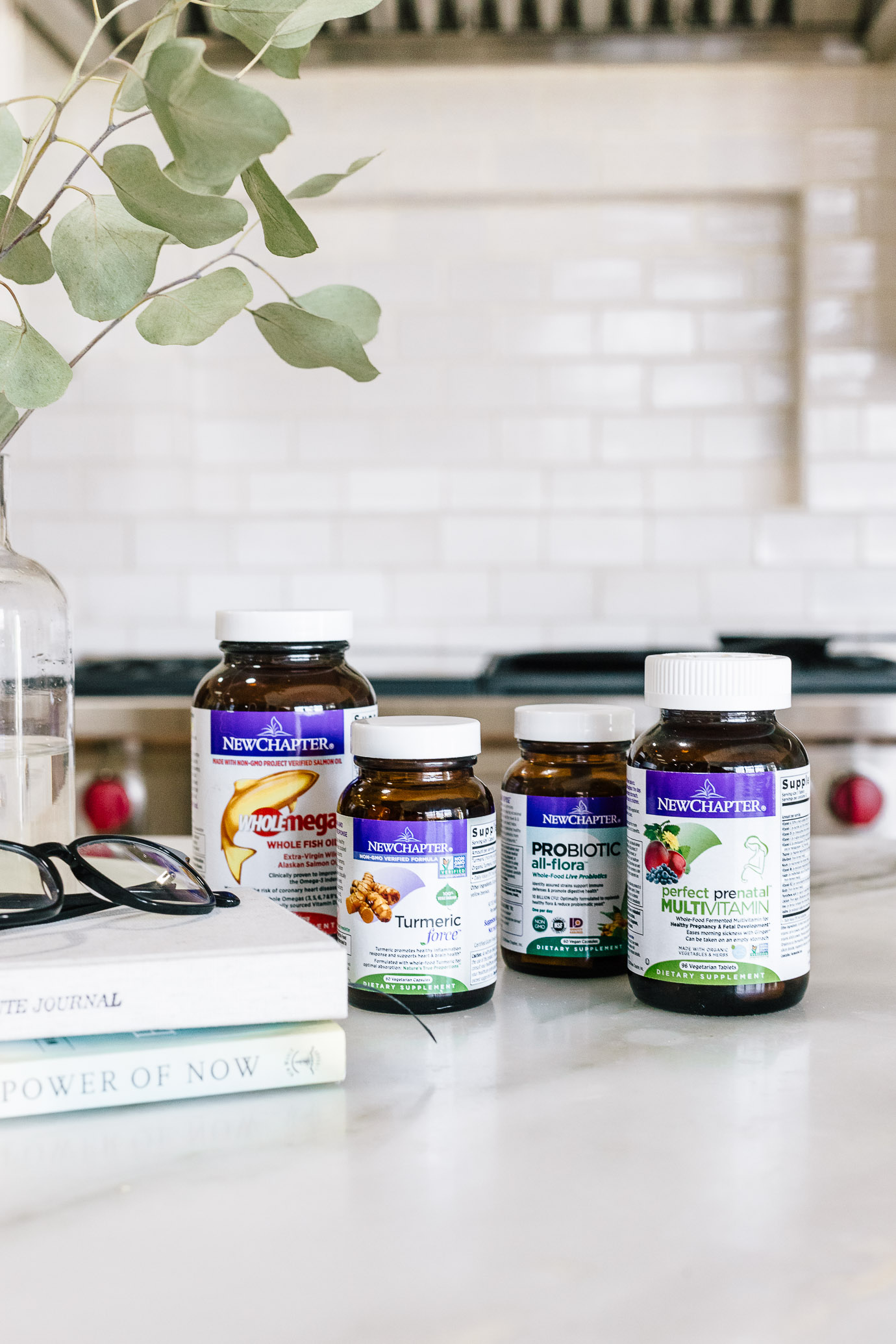
Essential Daily Supplements Recommendations
Multivitamin/Prenatal – amount varies; whole-food supplement
Taking a regular multivitamin or prenatal multivitamin creates a solid foundation for ensuring you are getting the nutrients you need daily. Think of a multivitamin as an insurance policy. It’s able to fill in the gaps of the vitamins and minerals you may be missing that day. I recommend all women of child-bearing age take a prenatal even if they’re not trying to get pregnant (more on this to come!). Post-menopausal women and men are fine taking a regular multivitamin.
When it comes to choosing a multivitamin or prenatal, it should include vitamin A, folate, B vitamins including vitamin B6 and B12, vitamin D3, chromium, iron, magnesium, zinc, copper and selenium. I recommend choosing a whole-food fermented supplement. This means that the nutrients come from food sources not just synthetic.
This is why I absolutely love New Chapter’s Perfect Prenatal or Every Women’s One Daily Multivitamin. These are whole-food supplements that are fermented. The fermentation makes the nutrients easier for the body to absorb. They’re also packed with additional superfood ingredients to help support overall optimal health including stress and immune balance.* The multivitamins contain a unique blend of herbs like turmeric, maca, red clover, and elderberry, while the prenatal multi contains a blend of pregnancy-safe herbs like turmeric, peppermint and lemon balm, plus clinically studied Ginger to help soothe nausea (morning sickness).
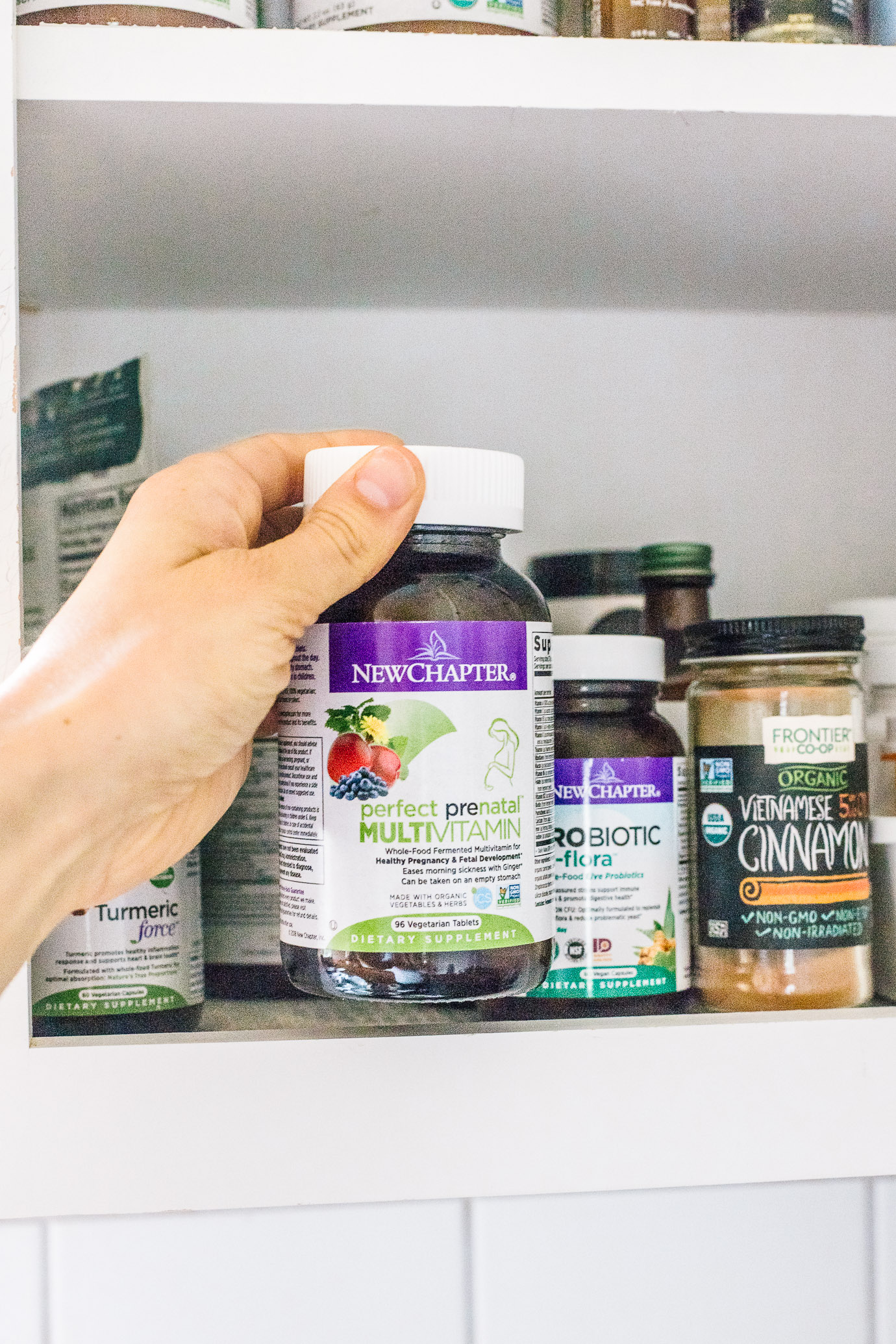
Omega-3 – 2000 mg per day with at least 900mg pre-formed EPA and DHA and sustainably sourced.
Omega-3 fatty acids are essential for keeping the heart and brain healthy and also reducing inflammation. We need omega fatty acids for maintaining healthy hair and skin, elevating our mood, nourishing the brain, and supporting healthy pregnancy and breastfeeding. It’s ideal to get a 1:1 ratio of omega-3s to omega-6s in your diet. Standard american diets tend to be high in vegetable oils which create a range from 12:1 to 25:1 ratio of omega-6s to omega-3s.
Omega 3s are found in fatty or cold water fish like salmon, trout, mackerel, sardines and some plant-based foods like flax, walnuts, hemp, chia seeds. The three key omega fatty acids include ALA, EPA, and DHA. EPA and DHA are the most easily absorbed and come mainly from fish and animal products. ALA comes from plant foods, but it needs to be converted into either EPA or DHA in order for the body to use. Since the conversion of ALA is less than 8%, it’s important to make sure you are getting EPA and DHA.
New Chapter’s Wholemega Whole Fish Oil is made from 100% wild-caught Alaskan Salmon. It’s a pure 2000mg dose of fish oil that contains 520 mg of Omega 3s, 400 of which are EPA and DHA. It also includes the antioxidants and Vitamin D3 that is naturally found in wild caught salmon. I love that heart-heatlhy Wholeomega has a bright amber color from Astaxanthin, an antioxidant naturally found in Wild Alaskan Salmon. Plus, it’s 100% sustainably caught, meaning no overfishing, no bottom trawling, no wasted catch, no fish farming.
Probiotic – 10 billion CFUs and shelf-stable
Probiotics are the supplemental live bacteria and microorganisms that help keep the proper balance of beneficial bacteria in your gut. Think of probiotics as the fertilizer that keeps your gut alive and flourishing. Probiotics have been shown to improve digestion, strengthen our immune system, and aid in the absorption of some nutrients.Food sources of probiotics include miso, tempeh, kimchi, kombucha, kefir, sauerkraut and yogurt. While I recommend trying to incorporate these foods daily, most individuals aren’t. Adding a probiotic supplement daily can help support a healthy balanced gut as well as help replenish the good bacteria that might have become depleted.
I love New Chapter’s Probiotic All-Flora because it’s a 3-in-1 blend that delivers Prebiotics, Probiotics, and Postbiotics, with clinically studied strains in the amounts you need. These work in combination to give your gut everything it needs to help support a balanced microbiome.* It also supports healthy immune defenses.*
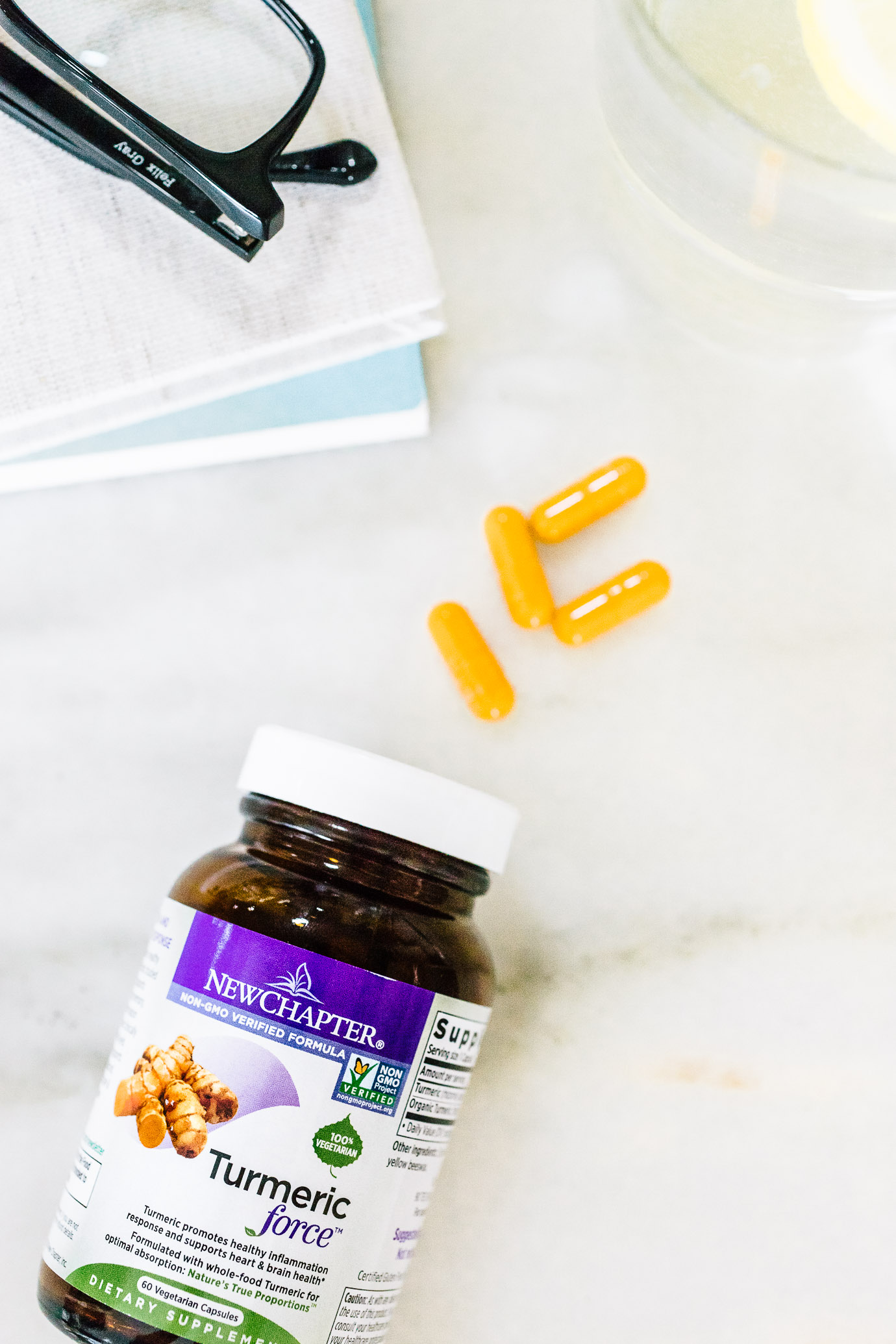
Vitamin D – at least 1,000 IUs with K2
Vitamin D is essential to support proper immune function, gut health, brain health, and hormone balance since it acts as a hormone in the body to regular calcium and phosphorus. While you can get vitamin D from a few food sources like eggs, some dairy products, certain mushrooms, salmon, and fortified foods, the majority of vitamin D comes from the sun.
Most individuals who spend a majority of their day inside and/or wear sunscreen outdoors are at risk for vitamin D deficiency. It’s estimated 42% of the people in the US may be vitamin D deficient. If you aren’t getting at least 20 minutes of unprotected sunlight per day or depending how far north you live, you may need to supplement, especially during the winter months. For those looking to maintain their vitamin D levels, 1000 IUs per day in the summer (with enough sun exposure) and 2000 IUs per day in the winter should be sufficient. However, the best way to know how much vitamin D you need is to get your vitamin D levels tested.
New Chapter’s Bone Strength Take-Care is a good option for people looking to supplement vitamin D. It contains calcium, 1000 IU of Vitamin D3 and vitamin K2.
Turmeric – whole root turmeric supplement
Adding in a turmeric supplement is a bonus to your essential daily supplements. Turmeric is one of the most extensively researched spices and well known to help support optimal inflammation response in the body. It’s also amazing for supporting brain and heart health. One of the active ingredients in turmeric that gives the root its health benefits is curcumin.
So why don’t you just use turmeric to spice your food? While I still recommend this, most Americans aren’t eating this much turmeric spiced foods like curries on a daily basis.
This is why taking a turmeric supplement can be so beneficial. I trust and recommend New Chapter’s Turmeric Force as a high-quality turmeric supplement. Unlike other turmeric supplements that rely on chemically extracted curcumin and black pepper for absorption, New Chapter’s whole herb Turmeric retains all of the roots beneficial compounds, including turmerones, critical oils that aid your body in absorbing curcumin. By using the whole Turmeric root instead of just extracting and isolating curcumin, Turmeric Force delivers the full healing benefits of the 100s of beneficial compounds found in the turmeric root.
I love this because nutrients, antioxidant and other plant compounds don’t work in isolation. They are all packaged in a unique way their whole food to work synergistically with the other components. Adding in Turmeric Force as well as eating a balanced diet and incorporating ground or fresh turmeric into your daily meals is a great way to optimize your body’s ability to balance inflammation.*
Bottom line:
Supplements are just as the name implies, a supplement to your diet. They should be viewed as your insurance policy or support system, not a replacement for a nutritious diet. To help fill in the gaps, taking a few essentials daily supplements like a prenatal or regular multivitamin, omega-3, probiotic, vitamin D and turmeric that can help support optimal health. Just remember that your needs are unique, so it’s best to work with a registered dietitian or your doctor to figure out what supplements are best for you.
*These statements have not been evaluated by the Food and Drug Administration. This product is not intended to diagnose, treat, cure, or prevent any disease.
This post was created in partnership with New Chapter. As always, I only partner with brands I love and use. I share them because I want you to love them as much as I do. Thank you so much for supporting the sponsors that keep Nourished by Nutrition going!

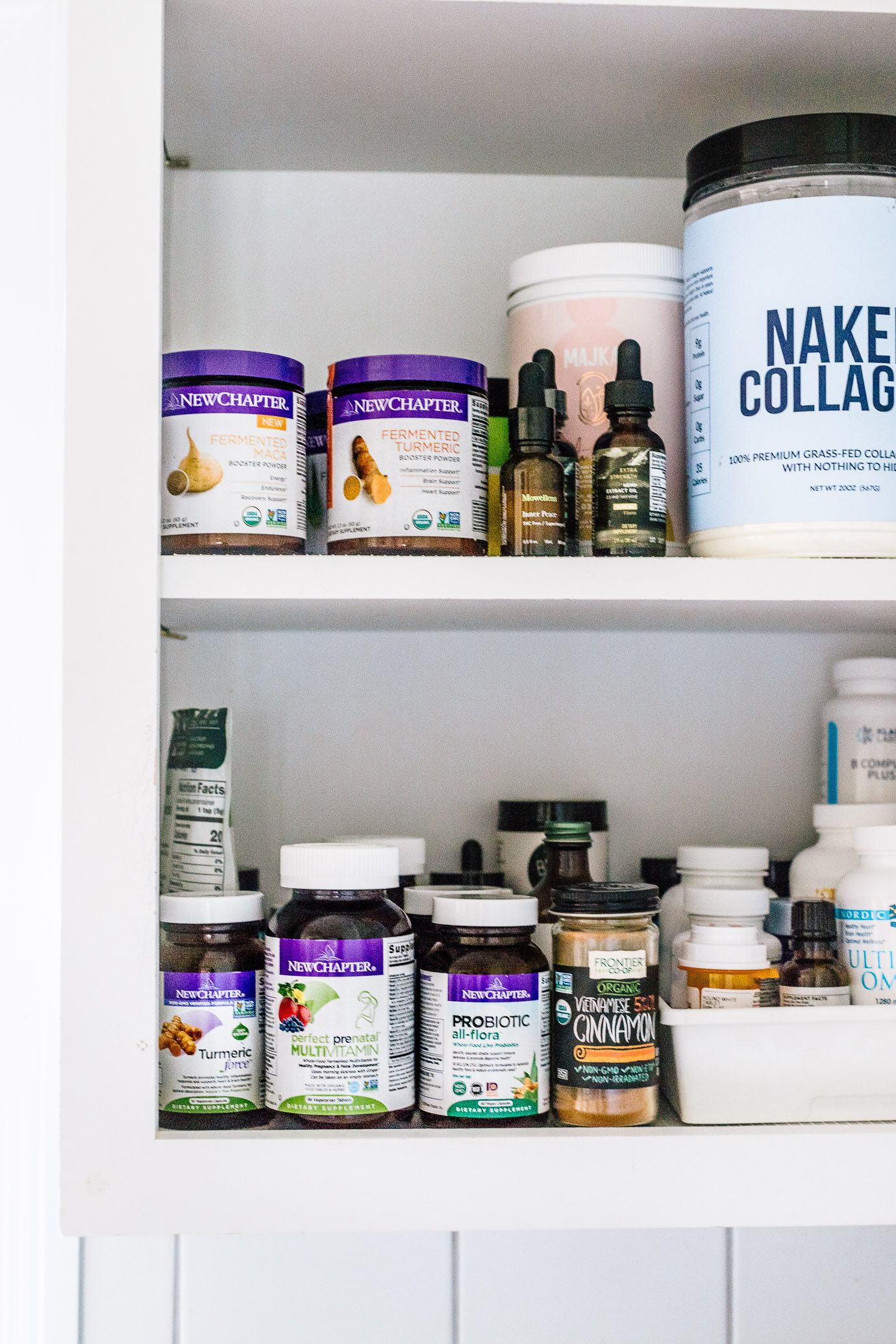
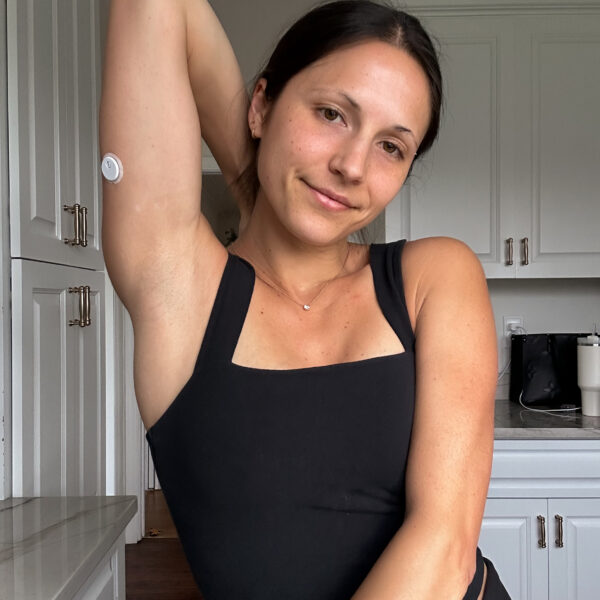


[…] herbs and supplements to your daily routine is an easy way to help your body manage stress daily. While there are several supplements that can […]
[…] https://www.amydgorin.com/top-supplements/https://nourishedbynutrition.com/registered-dietitians-guide-essential-daily-supplements/ […]
[…] https://nourishedbynutrition.com/registered-dietitians-guide-essential-daily-supplements/ […]
[…] you think of gut health you probably think of the foods you eat and probiotics you take as supplements. If so, you’re right! These two things go hand-in-hand in order to create a healthy gut […]
[…] whole grains is ideal. But, let’s face it. It’s not always easy. That’s why I recommend these essential daily supplements. Taking daily supplements is a wonderful insurance policy. And to be extra-sure all those nutrients […]